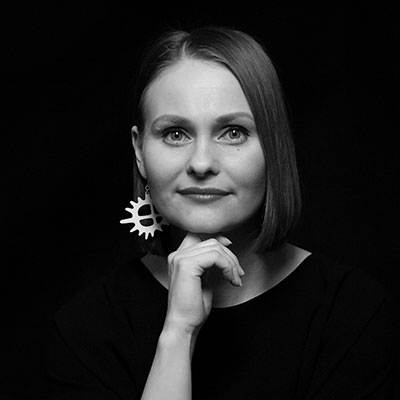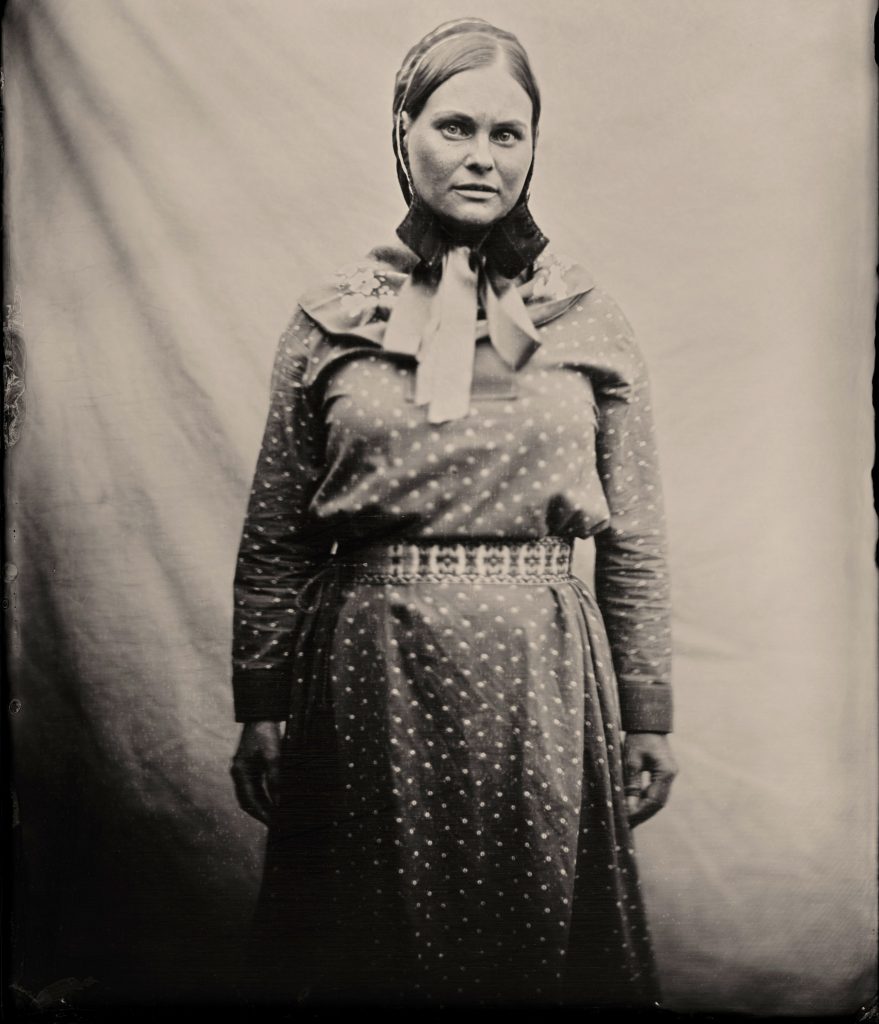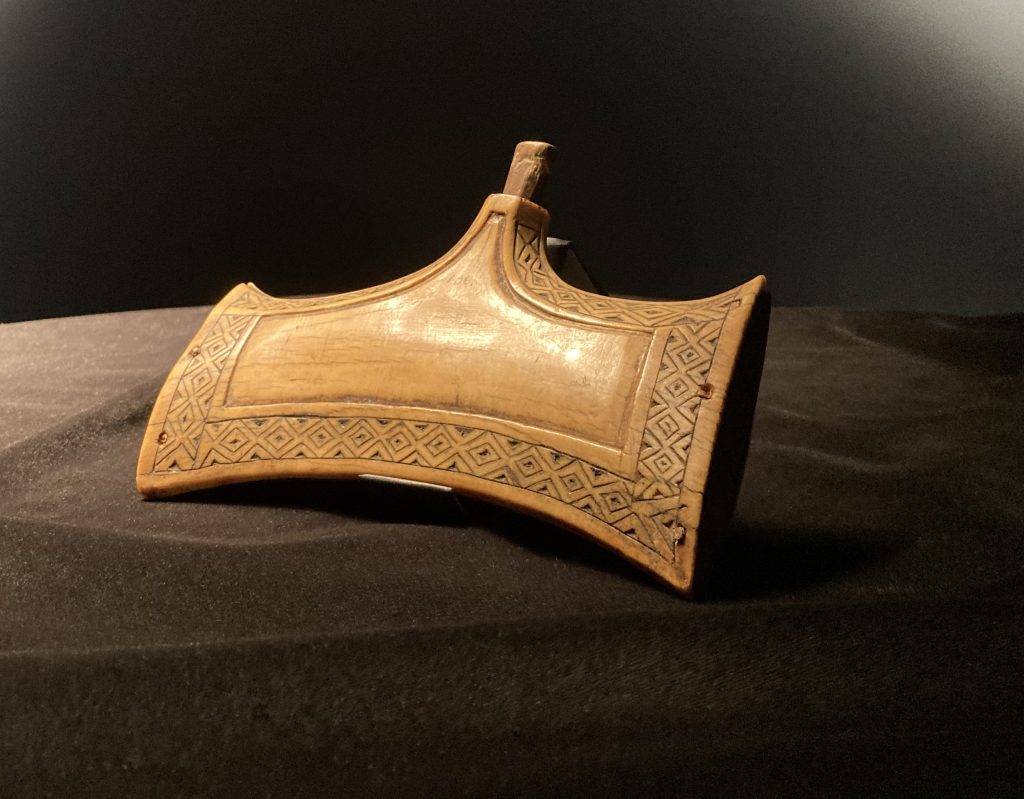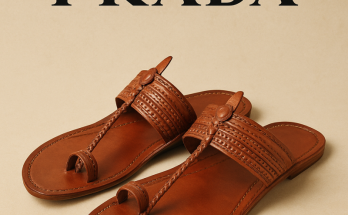#Homecoming; #museum; #Sámiartifacts; #Repatriation
Co-directed by Suvi West and Anssi Kömi, TIFF 2023 film ‘Homecoming’ shares a personal and insightful story about the return of Sámi artifacts, which were long held in a museum, to their homeland. During a dialogue with Suvi West and Anssi Kömi, IBNS/TWF/Canadian Media’s Asha Bajaj had a chance to learn about their important adventurous and touching journey about the return of Sámi artifacts from the museum to their homeland.
Following is the extract of the interview:
1. To Suvi West: Working for Sami radio and the Norwegian broadcasting company NRK as a television news and documentaries producer you already had an inclination towards documentaries. What led you to select the theme of museums?

Suvi West. Image credit: TIFF 
Suvi West in an old fashioned wet plate. Image credit: Ry Levey
Suvi: It was more like a rational collection. It was kind of we knew that this is something was very important and we had documented and themes of representation and other necessary themes in person and I think museums are centre of those who felt it was very important to deal with those questions.
2. To Anssi Kömi: What challenges did you face if any in the field of cinematography?
Ansi: Well funds as always. At the start of the process, the challenges were using of museums and items that would allow us to capture the film.

3. To both Suvi and Anssi: Can you describe the process adopted by you in the return of Sámi cultural artifacts to the community?
Only in the middle of the process did we realize that we needed a cinemacope to explore our ancestors and other side of the earth and underworld and also the language of the film more than anything. We had already shot a lot of material when we realized what the film is really about and we changed like everything and we had to push the material.
4. To both: Were you both exposed to the museums earlier?
We had seen a lot of museums and it was kind of a new world for us to go behind the museum. So as viewers we had been there as visitors and the only time we were able to get behind the scene and found that it was an amazing, philosophical world and it was spiritual as well. We felt very privileged to be seen and going to the discussions and we were so fascinated about these. Beforehand we did not know about the museum world and its structure. So it was a kind of new world for us too.
5. To both: When you were visiting museums were you aware at that time that you would be documenting these into a film?
No, we were just visiting these as regular visitors and when we heard about this repatriation, then we decided to make a film. Museums are very much dealing with the ancestors, collection and belonging but first we thought it would be more about the museum structures than anything else with more like a journalistic approach. So that was what we thought it is kind of be but then it totally changed. The themes started to fly when the ancestors and emotional side came and we took a journalistic approach.
To Ansi: You are the co-director of this film. Did you produce films and documentaries earlier?
Yes. Before co-directing this film I was in TV shows and I have been working as a cinematographer and an editor for 26 years or so. We had been working together for more than 11 years or so. We are a couple.
6. Can you describe the process of return of the artifacts from the museum to the community?
Suvi: It was very emotional to have those items that were stolen and it was amazing to witness to see what people felt about the emotional connections. It was only with the items. It was not about the artifacts. The meaning of the artifacts and the previous owner as to who has made it. It is that kind of connection that I think is extremely valuable. It was actually a healing process.

7. Were you able to resolve the important question of who has the right to a nation’s spiritual heritage?
Suvi: I think that the original owners had a right to these items and could make a personal decision. The artifacts actually tell the story of the nation’s culture. And if that story is told by outsiders it is very rare that the real story is known. It would be just like a broken picture of a true history and many times colonial. So the nation thinks that it needs to get back its stolen items which would enable them to start their own healing process and would also start to tell their own stories. Not all of the items needed to come back. There are some semi artifacts which were not stolen and it was not necessary that they should come back. There were all kinds of artifacts that symbolized and that the original owners should be heard. That would also benefit the museums and the people when they get items there would be so much knowledge that the people have. People of Suvi can read the items like a language. There was no way that any outsiders would know about these itesm. I think that through the repatriation process the world wins in many ways.
8. To Suvi: In order to make a tangible connection to your ancestors, what disturbing truths were you able to uncover during your travels to museums in Germany and Sweden looking for your family’s property?
I think the connection to semi-culture is that we believe that ancestors live in the outside world which is and they give advice from there and sometimes you could hear the advice when they are present better than at other times. And during the process of both in the films and in the process of making the films there was sometimes a strong connection felt and at other times we could barely hear anything. I felt that I lacked that connection. And it varied according to the places where I was. When I was in Berlin it was surprisingly emotionally hard to be there because I felt the pressure of exploitation of racial studies and it was surprisingly tough for me to realize than before that shooting was hard. In Sweden the feeling was totally different. I felt it was not about museums. It was not like a collective burden anymore. It was more about my personal connection to my ancestors. In Berlin it was more about collecting items. The collective history at many times could be heavier than like the individual history.

Asha: That was the next question I was going to ask. The next question I was going to ask is how did you manage to portray the whole nation’s collectively shared experience in your own personal experience? You have already answered this.
9. To Suvi: How did you throw light on the rights of Sámi’s heritage, identity, religion and ancestors being taken away?
Suvi: I did not understand then what was going on in the museum world when we started to make this film. But when we started to dive into the story we began to understand more about how it affected representation of today. Even though they were historical artifacts, its effect is still felt today. This is how the museums have been portrayed to the Samis in earlier days and still do. I also can still feel its effects today as I am also a Sami. All the images of Sami are very ethnic and very historical and then when I go there with high heels and Western dress then I feel I do not look like a Sami and you can feel what it is like to have these pictures taken away or stolen years ago. And that is a burden which me and other Samis carry when we are told that we are ruled by the Western culture and modernisation and we are told that that is not true. We have our own culture living lively today as well. Only difference is that we do not behave like our ancestors hundreds of years ago. I think that it is a kind of racial take on when we are questioned.

10. What encouragement did you provide the whole sámi community to deal with the wrongful history and their past?
Suvi: When you are a Sami, and well it goes with other indigenous people too, I think that unfortunately weto our people. are born with this kind of inner belief that we have to serve our nation and whatever we have to do we have to pass on to my community. Since I am a filmmaker it is my task and responsibility to tell these stories about museum repatriation. But of course with individual burn and desire inside we feel that I want to do this, And when Sami people come to me and say that I do such an important work. it is sometimes difficult to take this. I am not saying that I do these things because of my egoism or for my journalistic purposes, but when they say this I feel better.
11. Can you throw some light on your future endeavours?
Suvi: Well my background is actually from TV comedy. But because of the world where we are living, I have ended up working with human rights documentaries and different subjects. But right now I feel I am in a different stage as I have to find out more about myself and how I used to work when I was younger. I feel I have to go back where I really started all this. It makes me think whether I should follow comedy or absurd dark comedy. I have now finalized my feature fiction and we have to wait and watch what will happen next. I am also writing a non-fiction about being a Sami female filmmaker and trying to find liberation from all those expectations, all those obligations and how to find the pure artistic flow. I am trying to get liberated by story telling because through story telling I have conversation with God. That is why I write these stories





